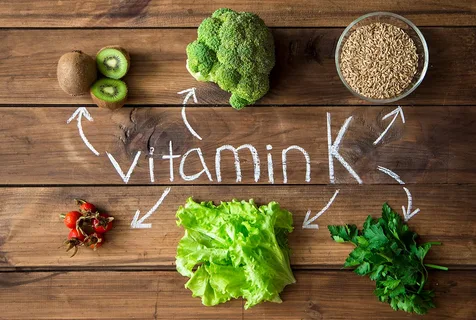Introduction to Vitamin K2
Vitamin K2, also known as menaquinone, is a lesser-known yet essential nutrient that plays a crucial role in various bodily functions. While its counterpart, Vitamin K1, primarily supports blood clotting, Vitamin K2 has a more diverse range of benefits, including bone health, heart health, and even dental health. Despite its importance, many people are unaware of the significant advantages that Vitamin K2 offers. In this comprehensive guide, we will delve deep into the benefits of Vitamin K2, its sources, recommended intake, potential risks, and frequently asked questions surrounding its use.
Bone Health
One of the most well-known benefits of Vitamin K2 is its role in bone health. Vitamin K2 activates osteocalcin, a protein hormone that helps bind calcium to the bone matrix, strengthening bones and reducing the risk of fractures and osteoporosis. Research suggests that adequate intake of Vitamin K2 may help improve bone mineral density and reduce the incidence of fractures, especially in postmenopausal women and older adults.
Heart Health
In addition to its effects on bone health, Vitamin K2 has been linked to cardiovascular health. It helps prevent the calcification of arteries by directing calcium away from arterial walls and towards bones and teeth. By inhibiting arterial calcification, Vitamin K2 may reduce the risk of cardiovascular diseases such as heart attacks and strokes. Several studies have demonstrated a correlation between higher Vitamin K2 intake and a lower risk of coronary artery calcification and cardiovascular events.
Dental Health
Emerging research suggests that Vitamin K2 may also play a role in dental health. It is believed to support the remineralization of tooth enamel and prevent dental cavities. By promoting the deposition of calcium in teeth, Vitamin K2 may help maintain optimal oral health and prevent tooth decay. While more studies are needed to fully understand the relationship between Vitamin K2 and dental health, preliminary evidence is promising.
Cancer Prevention
Some studies have suggested a potential link between Vitamin K2 intake and a reduced risk of certain cancers, including prostate cancer and liver cancer. Vitamin K2’s ability to regulate cell growth and inhibit the proliferation of cancer cells has sparked interest in its potential role in cancer prevention and treatment. However, further research is required to establish a definitive connection between Vitamin K2 and cancer prevention.
Brain Health
While research on this topic is still in its early stages, some evidence suggests that Vitamin K2 may have benefits for brain health. Vitamin K2 is involved in the synthesis of sphingolipids, essential components of brain cell membranes. It also exhibits anti-inflammatory and antioxidant properties, which may help protect against neurodegenerative diseases such as Alzheimer’s and Parkinson’s disease. While more research is needed to confirm these potential benefits, maintaining adequate levels of Vitamin K2 may support overall brain health.
Recommended Intake
The recommended intake of Vitamin K2 varies depending on age, sex, and other factors. The Adequate Intake (AI) for Vitamin K2 has not been established by official dietary guidelines in all countries. However, some experts recommend a daily intake of around 100-200 micrograms (mcg) of Vitamin K2 for adults. It’s essential to obtain Vitamin K2 from dietary sources, as the body has limited ability to produce it on its own.
Food Sources of Vitamin K2
Vitamin K2 is found in a variety of foods, with fermented foods and certain animal products being the richest sources. Some of the best dietary sources of Vitamin K2 include:
- Fermented soybeans (natto): Natto is a traditional Japanese dish made from fermented soybeans and is one of the highest sources of Vitamin K2, specifically menaquinone-7 (MK-7).
- Fermented dairy products: Certain fermented dairy products like cheese and yogurt contain Vitamin K2, particularly MK-7.
- Meat and poultry: Organ meats such as liver and chicken are good sources of Vitamin K2.
- Egg yolks: Pasture-raised egg yolks are rich in Vitamin K2.
- Fish: Fatty fish such as salmon and mackerel contain moderate amounts of Vitamin K2.
Potential Risks and Side Effects
While Vitamin K2 is generally considered safe when consumed in recommended amounts from food sources, excessive supplementation may lead to adverse effects in some individuals. Since Vitamin K2 is involved in blood clotting, high doses of supplements may interfere with blood-thinning medications such as warfarin (Coumadin) and increase the risk of bleeding. Therefore, individuals taking blood-thinning medications should consult with their healthcare provider before supplementing with Vitamin K2.
Frequently Asked Questions (FAQs)
Can Vitamin K2 supplements replace Vitamin K1?
While Vitamin K2 and Vitamin K1 have some overlapping functions, they serve different roles in the body. Vitamin K1 is primarily involved in blood clotting, while Vitamin K2 plays a more diverse role in bone and cardiovascular health. Therefore, it’s important to obtain both forms of Vitamin K through a balanced diet for optimal health.
Is it possible to overdose on Vitamin K2 from food sources?
It’s highly unlikely to overdose on Vitamin K2 from dietary sources alone, as the body regulates its absorption and utilization. However, excessive supplementation with Vitamin K2 supplements may lead to adverse effects, particularly in individuals taking blood-thinning medications.
Can Vitamin K2 supplements improve bone density in individuals with osteoporosis?
Some research suggests that Vitamin K2 supplementation may help improve bone mineral density and reduce fracture risk, especially in postmenopausal women and older adults with osteoporosis. However, it’s essential to consult with a healthcare provider before starting any supplementation regimen, especially for individuals with pre-existing medical conditions.
Are there any natural ways to increase Vitamin K2 levels in the body?
Consuming a diet rich in Vitamin K2-containing foods, such as fermented soybeans, dairy products, meat, poultry, egg yolks, and fatty fish, is the best way to increase Vitamin K2 levels naturally. Additionally, promoting gut health through probiotic-rich foods may enhance Vitamin K2 production by gut bacteria.
Can Vitamin K2 supplements interact with other medications?
Vitamin K2 supplements may interact with certain medications, particularly blood-thinning medications like warfarin (Coumadin). Individuals taking these medications should consult with their healthcare provider before starting any supplementation regimen to avoid potential interactions and adverse effects.
Are there any specific populations that may benefit from Vitamin K2 supplementation?
While Vitamin K2 is beneficial for overall health, certain populations may particularly benefit from supplementation, including postmenopausal women, older adults at risk of osteoporosis, individuals with cardiovascular risk factors, and those with a history of dental issues. However, it’s crucial to consult with a healthcare provider before starting any supplementation regimen, especially for individuals with underlying health conditions.
In conclusion
, Vitamin K2 is a vital nutrient with numerous health benefits, including supporting bone, heart, and dental health, as well as potentially reducing the risk of certain cancers and supporting brain health. While Vitamin K2 is readily available from dietary sources, supplementation may be beneficial for certain individuals, especially those with specific health concerns.
- Nu-Derm Skin System Near Beddington, Surrey - December 28, 2024
- Neck Line Filler Treatment Near Ockley, Surrey - December 27, 2024
- Nefertiti Neck Lift Treatment Near Dockenfield, Surrey - December 27, 2024


